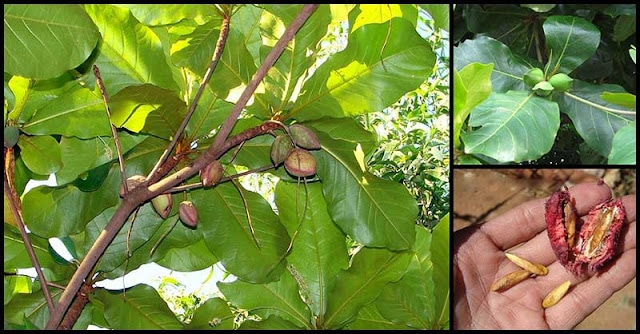Talisay tree is a shady and tall tree that can be found in lowlands or around the coast. In some countries, it is also known as Sea almond, Indian almond, Tropical almond, Beach almond, Bengal almond, Malabar almond, Singapore almond, Umbrella tree, and Ketapang or Katapang. It bears a yellowish-green, round and small fruit that turns into purple-red when it is ripe.
According to studies, Talisay seeds contain proteins as well as amino acids such as leucine, phenylalanine, isoleucine, histidine, valine, tryptophan, threonine, methionine, lysine and tyrosine.
Furthermore, it is also a good source of phytochemicals such as steroids, triterpenes, carbohydrates, flavonoids, tannins, triterpenoids saponins, alkaloids, polyphenols, and glycosides. Once these seeds are dried, they will produce yellow oil that is loaded with different fatty acids such as palmitic acid (55.5%), oleic acid (23.3%), stearic acid, linoleic acid, and myristic acid.
Additionally, beneficial nutrients are also present in talisay such as vitamin A, C and E, calcium, niacin, iron, copper, potassium, manganese, magnesium, selenium, and zinc.
Health Benefits We Can Get From Talisay Tree
Rich In Fiber
The fruit of Talisay tree taste like almond and contains good amounts of fiber which is needed for our digestive health and regular bowel movements. It helps us feel fuller for longer, improve cholesterol and blood sugar levels and assist in preventing some diseases such as diabetes, heart disease, and bowel cancer.
Loaded With Plant-Based Antioxidants
Talisay leaves are rich in flavonoids (quercetin or kaempferol) and tannins (punicalin, punicalagin or tercatin, saponins and phytosterols). Due to these components, it has been used to treat liver diseases. The leaves are used in making herbal tea. It binds and absorbs harmful substances which later on would be processed by the liver thus easing the burden the liver must bear and consequently giving it time to recover and keep it healthy.
Moreover, it has also been used to cure dysentery and treat various forms of intestinal parasites.
Has Anti-Cancer Properties
Because of the antioxidants present in Talisay leaves, it can fight off free radicals that cause many types of cancers. According to studies, extract from its leaves can fight strains of Plasmodium falciparum chloroquine (CQ) -resistant (FcB1) and CQ-sensitive (HB3).
Helps Treat Rheumatism
Talisay tea has diuretic properties. Consumption of it can help maintain kidney health and regulate fluids in the body. Rheumatism is a condition that is also caused by the presence of water in the joints. The tea may help discharge the excess fluid to provide some relief from joint inflammation. Also, applying the leaves in the form of dressing is commonly believed to lessen rheumatism.
Helps Improve Heart Heath
According to research, consumption of Talisay fruits and seeds can help lower down cholesterol levels by more than 30%. Its seeds contain vitamin E which aids in reducing the amount of C-reactive protein that can cause inflammation of the arteries that lead to increased risk of a heart attack.
Helps Fight Skin Disease Like Dermatitis
The leaves can be used to treat dermatitis, a skin irritation that usually involves itchy, dry skin or a rash on swollen, reddened skin. Or it may cause the skin to blister, ooze, and crust or flake off. This can be due to external factors or allergic reactions.
Helps In Hepatitis Treatment
Research by Lin et al (1997), shows that Talisay has strong antipathetic effects including superoxide radical scavenger activity to help treat hepatitis.









